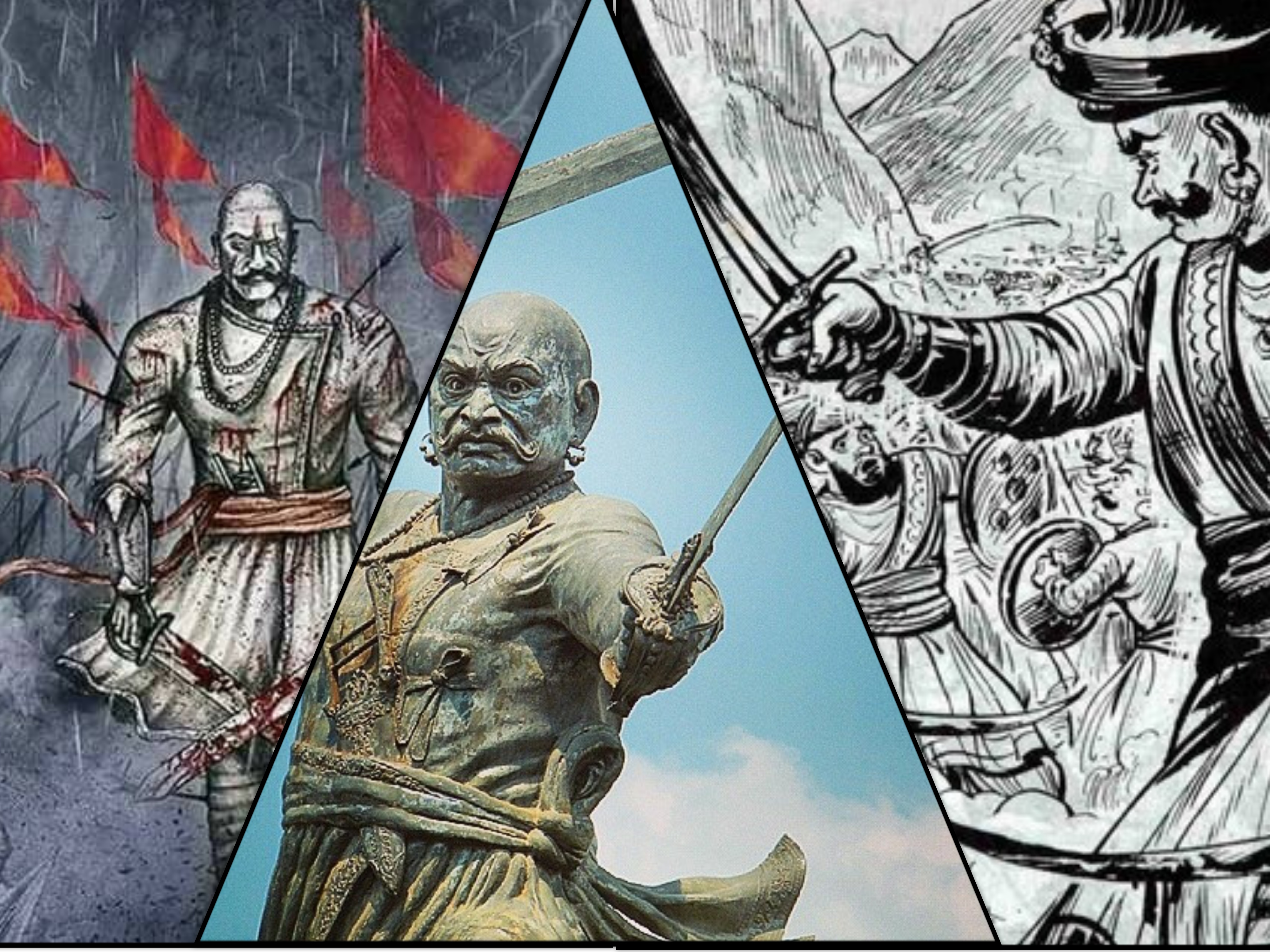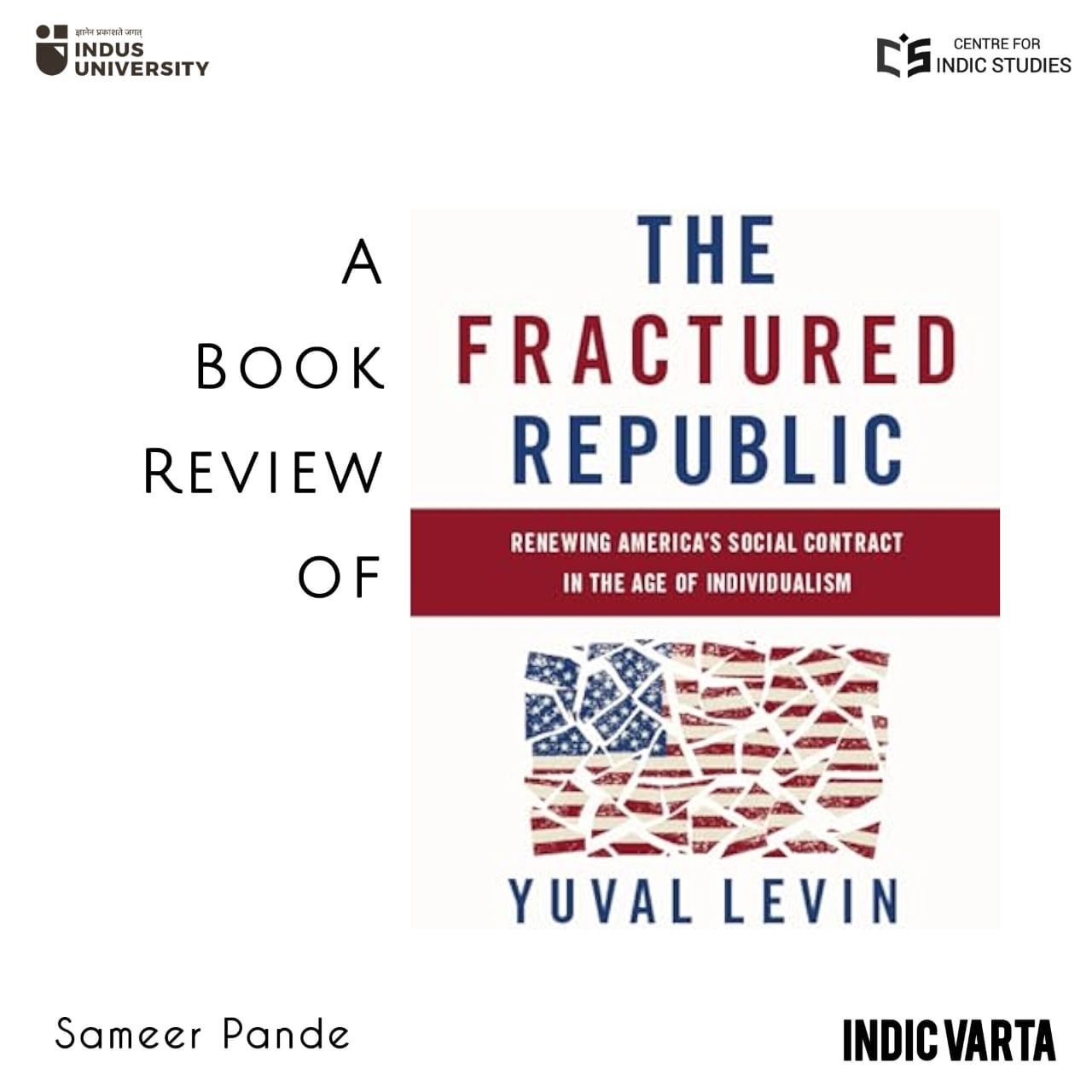- Visitor:812
- Published on: 06:05 pm
BAJI PRABHU DESHPANDE: HERO WHO LIVES ON DESPITE NEGLECT FROM MAINSTREAM HISTORIANS
As the nationalists of the twentieth century drew courage, valour, and motivation from the heroics of Baji Prabhu Deshpande, a warrior from the seventeenth century, it becomes evident that the Baton of Dharma is passed on from one generation to the next. This reveals the nature of our duty towards the nation, which is never entirely completed but must be continually fulfilled in every Yuga, guided by the Yuga Dharma.

The Maratha Warrior, a trusted companion of Chhatrapati Shivaji Maharaj, exerted pan-Indian influence on the political spectrum as late as the twentieth century.
A cursory glance at untouched annals of history penned down by regional historians in Maharashtra reveals a pantheon of unsung heroes, who akin to lions, defended the Nation with their unparalleled courage. Unfortunately, those entrusted with the duty of telling our Nation’s story to posterity cleverly concealed the valorous chapters of the country’s past. In history books designated for schools and colleges, India is often depicted as a mere stopover or “Sarai” for marauding invaders, which is why one may wish to ask from where the city of Mughalsarai in Uttar Pradesh, now renamed as Pandit Deen Dayal Upadhyaya Nagar, derived its name.
The accounts of the warriors who
defended the Nation and protected its integrity with their own lifeblood find
little or no mention in the mainstream historical discourse. Even if their names
are acknowledged, they are often relegated to mere footnotes or dismissively
referred to as "local chieftains" or "aggressors." The
consistent and deliberate sidelining of our national heroes puts our collective
identity at stake.
One such unsung hero is Baji Prabhu Deshpande, a trusted companion of Chhatrapati Shivaji Maharaj, who orchestrated an audacious defence with a limited group of men, effectively blocking the advancing Bijapuri forces and ensuring the safe passage of his King to Vishalgadh, thereby protecting his Motherland. One might question the contemporary relevance of a warrior who lived and died in the seventeenth century. Yet, upon a closer study of history, one shall see, that Baji Prabhu's legacy is intrinsically relevant to our national life. In order to safeguard the future of our Nation and to ensure that it continues to live and prosper for eternity, it is crucial to evaluate from where we derive our values, inspiration and identity. Merely memorizing the names of our warrior ancestors for the sake of academic pursuits or competitive examinations is insufficient. What ought to be understood and internalised by the youth is why exactly such personalities are venerable to us. We need to delve deeper into the values they lived by and the principles they held dearer than their own lives, principles that could not be negotiated. These values are the cornerstones of our national identity, they are the bedrock upon which the edifice of our nation stands. For India to endure in the comity of nations, it is important for it to retain and stand firmly anchored in the fundamental ethos which defines its identity.
Who was Baji Prabhu Deshpande?
Born in the early seventeenth century
in Shind, located in the modern-day Pune district of Maharashtra, Baji Prabhu
Deshpande played a significant role in Chhatrapati Shivaji Maharaj’s campaign
of vanquishing the enemies who had enslaved and subjugated major parts of central
India.
Painting from the
20th century depicting Baji Prabhu alongside Shivaji at Pavan Khind, created by
M.V. Dhurandhar. (From Wikipedia)
On July 13, 1660, near the Vishalgadh
fort in modern-day Kolhapur, Baji Prabhu Deshpande led his troops into the
famous Battle of Pavankhind. What transpired in the background is noteworthy.
Chattrapati Shivaji Maharaj, along with his trusted Lieutenants, resolved to
reclaim all the strategic forts seized by the invaders. This was to be the
stepping stone in establishing Swaraj.
Following the victory
over Afzal Khan at Pratapgad, Chhatrapati
captured the Panhala fort, which bore great military significance. However, the
path to victory was fraught with many challenges. Adil Shah, upon realising the
fort had slipped into the hands of the Marathas, sent his forces who besieged
the Panhala fort, cutting off all supply routes. Something needed to be done at
the earliest. This led to an audacious escape program. In a daring move, it was
decided that Chhatrapati Shivaji and Baji Prabhu Deshpande would break the
siege. One of the Chhatrapati’s trusted men, bearing uncanny resemblance,
decided to mislead the pursuers and get caught himself. However, the Bijapuri
forces soon realized the deception and a frantic chase ensued.
At Ghodkind, Baji Prabhu requested the
Chhatrapati to proceed to Vishalgadh, meanwhile, he and his men would fend off
advancing troops, buying precious time for the latter to reach the fort safely.
The plan involved great personal risk for Baji Prabhu, a
moment he possibly always anticipated. As the enemy approached, he led
his small contingent of three hundred Marathas valiantly defending against a thousand
incoming marauders. Despite sustaining mortal injuries, they held off the enemy
forces for over eighteen hours, ensuring Shivaji's safe passage to the
Vishalgadh Fort.
Baji Prabhu Deshpande and the band of valiant
soldiers sacrificed their lives to keep Chhatrapati Shivaji Maharaj and the dream
of Swaraj alive. The act of self-consecration at the altar of duty reflects a philosophy
deeply rooted in our civilizational values. For gallant warriors in our history,
sacrifice of the self becomes a sacred duty in the service of the nation. They
live by the principle that the mission transcends the individual, and
individuals are but instruments in the hands of a greater purpose. Baji Prabhu's
valour and devotion to the cause of Swaraj exemplify the spirit that has
defined the history of the sacred land of Bharatvarsha, where individuals willingly
lay down their lives so that the legacy of Bharatvarsha may endure.
This spirit echoes through the
twentieth century as well, where selfless nationalists united across the nation
to challenge the imperialistic British Raj, drawing inspiration from the rich
spiritual heritage of their glorious past.
Nationalists in the Twentieth Century Sought
Courage from this Seventh-Century Warrior
Historians, in independent India,
would like us to believe that India’s Independence Movement traces its origin to
the economic struggles shaped by class movements. What they do not want us to
unravel is a two-folded truth. Firstly, the Freedom struggle in India had
spiritual underpinnings, and, secondly, India had a long and continued past
that went back to ancient times, claiming an unbroken antiquity.
In 19th century Bengal, Nationalist
leaders sought inspiration from Heroes in the past who transcended regional
barriers and wrought for the integrity of the whole of Bharatvarsha. To kinder
the patriotic fervour among the masses, Sri Aurobindo composed a long ballad
titled “Baji Prabhou", honouring the
valour of Baji Prabhu Deshpande whom he considered a Pan-Indian hero capable
of inspiring countless young souls.
Some lines of
the poem have been reproduced here:
Then
Baji first broke silence,
"Lo,
the surge!
That was but spray of death we first repelled.
Chosen of Shivaji, Bhavani's swords
For you the gods prepare. We die indeed
But let us die with the high-voiced assent
Of Heaven to our country's claim enforced
To freedom." [1]
Not only Aurobindo, but several other prominent figures of that time, including Rabindranath Tagore, Bipin Chandra Pal, and Sakharam Deveskar, revered numerous Maratha warriors and drew parallels between their resistance against invaders in their era and the ongoing struggle against the British. As Tilak famously declared Swaraj as one's Birthright, it prompts one to ponder how the vision of Swaraj envisioned by Shivaji in the seventeenth century became a rallying point in the fight against the British. Novels, poems, and plays emerged, invoking the memories of Indian heroes like Chhatrapati Shivaji Maharaj, Maharana Pratap, Jessore ruler Pratapaditya, and others. This significantly influenced and deepened the national consciousness that blossomed in 19th-century Bengal, serving as motivation for the revolutionaries of that era.
This is the cover of “Bhawani Mandir,” the
political pamphlet penned by Sri Aurobindo. The pamphlet was produced as
evidence during the Alipore Bomb Case. It bears the signature of Barindra Kumar
Ghose, Sri Aurobindo’s brother and the chief accused in the case.[2]
Sri Aurobindo's idea of Nationalism transcended
conventional framework, extending beyond civic or cultural expressions of
nationhood. His vision was deeply entrenched in spiritual principles and
volitions.
The genesis of this concept can be traced back
to the veneration of Bhawani, the goddess, by Chhatrapati Shivaji Maharaj. Sri
Aurobindo, building upon this historical devotion, went on to revere Bhawani as
the living goddess – the very embodiment of the nation — a concept encapsulated
in the pages of "Bhawani Mandir."
Soon the verses of the poets found
expression on the ground. What was proposed by Tilak in Maharashtra, was replicated
in the soil of Bengal in 1902, when “Shivaji Utsab” was commemorated with unprecedented
enthusiasm. Subsequently, a trend emerged, and the celebration began to be
conducted annually with thousands of attendees. It became a pulsating factor
that inspired the grand Swadeshi Movement in Bengal and later across the
Nation. The Celebration reached its pinnacle in 1906 when Leaders of all-India
repute such as Tilak, Khaparde, Lajpat Rai and Munje, attended the assemblage.
These events served as inspiration for
nationalist secret societies such as the Anushilan and the Jugantar Samities. Accounts
like that of Baji Prabhu Deshpande infused the Swadeshi Movement with new
meaning and bestowed upon it the foundational strength it required. These
pan-Indian personalities, who came to be revered and celebrated in Bengal, not
only offered revolutionaries replete courage but also instilled in them a
Pan-Indian Vision of Political Unity, bridging
diverse regional differences.
To that effect, Sri Aurobindo had expressed
in an article:
“The
moment the nation becomes politically self-conscious, the doom of the alien
predominance is sealed.” [3]
As the nationalists of the twentieth century drew courage, valour, and motivation from the heroics of Baji Prabhu Deshpande, a warrior from the seventeenth century, it becomes evident that the Baton of Dharma is passed on from one generation to the next. This reveals the nature of our duty towards the nation, which is never entirely completed but must be continually fulfilled in every Yuga, guided by the Yuga Dharma.
Reference:
1. [1] Mother and sriaurobindo. (n.d.). Baji Prabhou A poem by Sri Aurobindo.
https://motherandsriaurobindo.in/Sri-Aurobindo/poems/baji-prabhou/
2. [2] SRI AUROBINDO, BandeMataram Political Writings and Speeches 1890– 1908. (VOLUME 6 and 7 THE COMPLETE WORKS OF SRI AUROBINDO) (pp.75-92). Sri Aurobindo Ashram Publication Department
[3] ibid, (pp.365)
3. [4]Jain, Jinit. (2021, July 14). OPINDIA. Baji Prabhu Deshpande: The Maratha warrior who sacrificed his life for Chhatrapati Shivaji Maharaj.
4. [5]Majumdar, R.C., History of The Freedom Movement in India. (pp. 129-137). Vol II.
Center for Indic Studies is now on Telegram. For regular updates on Indic Varta, Indic Talks and Indic Courses at CIS, please subscribe to our telegram channel !
- 406 min read
- 0
- 0










